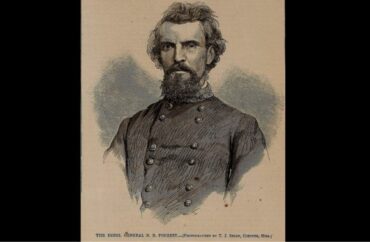
Renounced discrimination but still faces cancelation
Middle Tennessee State University is trying again to remove the name of Nathan Bedford Forrest, a Confederate lieutenant general and former Klan leader. His name is on the school’s Army ROTC building.
This is the university’s second attempt, as it unsuccessfully filed a similar petition in 2018.
In a recent hearing before the Tennessee Historical Commission, MTSU argued its case to obtain a waiver under the state’s Heritage Protection Act to rename Forrest Hall.
University representatives will participate in a final hearing before the commission early next year. The commission will issue a ruling within 30 days. To gain the authority to rename Forrest Hall, MTSU would need to obtain a 2/3rds vote in its favor from the commission, or at least 20 votes from the 29-member board.
MTSU media representatives did not respond to two emailed inquiries sent in the past two weeks.
The College Fix asked whether Forrest Hall is the only building for which the university is seeking a waiver for a name change from the Tennessee Historical Commission. Additionally, The Fix asked whether the university plans to change the name of the building to commemorate a specific person.
As a Confederate leader, Forrest (pictured) oversaw a massacre of black and white troops, even after the Union had surrendered. He was later a high-ranking leader in the Ku Klux Klan.
Near the end of his life, however, Forrest renounced his past support for racial discrimination against black Americans and advocated for the integration of America’s law schools.
In its petition for a waiver from the commission, MTSU stated “the interest of commemorating a famous Tennessean who has been dead for over 140 years is outweighed by the interest of thousands of citizens… who deem such commemoration . . . hurtful.”
The interest of these “thousands of citizens” proves “a substantial need based on compelling public interest,” to rename Forrest Hall. Under the Tennessee Heritage Protection Act, this “substantial need” standard must be met in order for the commission to authorize the removal of Forrest’s name from the ROTC building.
The rationale behind the Tennessee Historical Commission’s decision to deny MTSU’s waiver request in 2018 rested partially on the fact that a substantial majority of alumni of the school’s Military Science program opposed the renaming, according to an internal survey commissioned by the school’s Military Science Alumni Chapter.
Moreover, the commission at the time noted that the university failed to prove any racial intent behind Forrest Hall’s original naming.
The university has now moved to tailor its argument before the commission by citing changed circumstances in American civil society. In its most recent petition for a waiver, the university argues that the killings of Ahmaud Arbery, Breonna Taylor, and George Floyd in recent years have initiated a nationwide racial reckoning and necessitated the removal of Confederate figures from public view.
MORE: Wheaton College removes president’s name from library following racism report
Additionally, the university stated that protests on campus grounds calling for Forrest’s name removal have indicated grassroots support for the building’s renaming.
One student who is supportive of the renaming told The Fix the “entire community” supports the petition.
“It is not just a student effort. Instead, the entire community backs this effort,” Alyssa Williams told The Fix via email. “The only people that disagree with it are the Tennessee Monuments and Memorials Commission themselves. No one on campus wants the building to be named after Forrest.”
Williams also said Forrest Hall “is simply a building that perpetrates racist and white supremacist ideas,” and cuts “against MTSU’s mission statement, which wants to encourage a safe and diverse environment.”
However, historian Mary Grabar told The Fix that the lives and legacies of Confederate political and military leaders need to be interpreted with greater nuance.
There were “a good number of black slave owners who volunteered to fight for the Confederacy. And two of the black Congressmen elected after the Civil War, Joseph H. Rainey and Robert DeLarge, both from South Carolina, came from slave-owning families,” Grabar said. She is the author of “Debunking Howard Zinn: Exposing the Fake History That Turned a Generation against America.”
“Ultimately, it would be a blow to Americans’ understanding of history. As we saw in the great history purge of 2020 (the George Floyd riots), enraged activists have no limit to their animus,” Grabar said via email. “They begin with the easy targets, members of the Southern Confederacy, and then move on. In 2020 (they sought to remove) monuments to Abraham Lincoln and black Union soldiers and abolitionists.”
Grabar also said the Tennessee Historical Commission, whose members are appointed by the state’s elected officials, should avoid paying too much heed to student opinions when deciding whether to authorize the renaming of Forrest Hall.
“It is not up to the students. They are attending a public university that is supported by taxpayers,” Grabar said.
“Students are there to learn, not to make decisions that impact the way history is told. The voters’ representatives should, therefore, have the final say.”
MORE: Check out the Campus Cancel Culture Database
IMAGE: Harper’s Weekly
Like The College Fix on Facebook / Follow us on Twitter





Please join the conversation about our stories on Facebook, Twitter, Instagram, Reddit, MeWe, Rumble, Gab, Minds and Gettr.